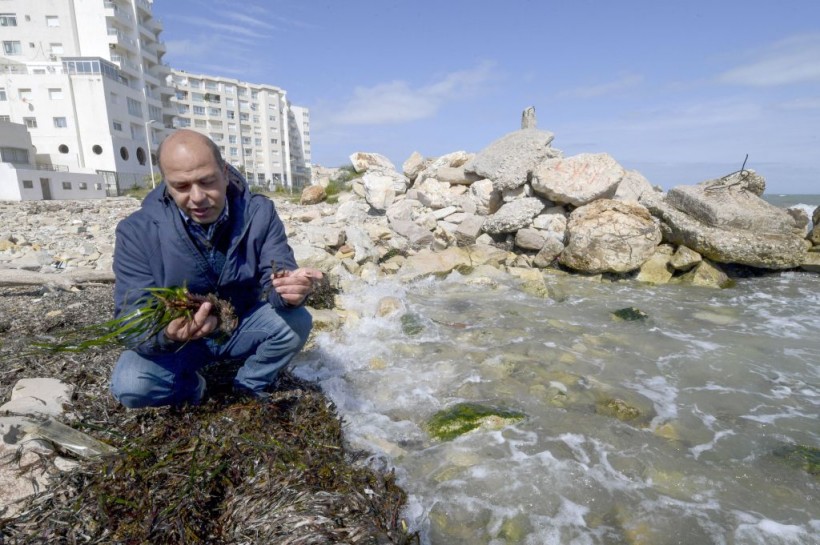The Mediterranean waters, particularly the coasts of the region of Tunisia, are full of seagrass meadows that serve as the natural cleaner of the sea.
Lungs of the Mediterranean in Danger

Tunisian marine biologist Yassine Ramzi Sghaier inspects a marine plant, from the Posidonia genus, in the capital Tunis on March 14, 2022. - Under the Mediterranean waters off Tunisia, gently-waving green seagrass meadows provide vital marine habitats for the fishing fleets and an erosion buffer for the beaches the tourism industry depends on.
Dubbed as the 'Lungs of the Mediterranean,' these plant structures existing underwater capture the excess carbon dioxide related to the place, buffer the uncontrollable erosion of the seafloor, as well as habitat for marine species dwelling in the region.
The seagrass is a vital component of the rich environment of the Mediterranean. With its presence, each city that depends on the waters for tourism and other economic benefits might not have achieved the prestige they have today.
The existence of this Mediterranean seagrass is crucial for the cycle of life in the places surrounding the sea. It naturally stores carbon underwater and is a great contributor of oxygen to aquatic groups.
However, recent observations show that human-induced climate change, as well as other destructive activities, gradually erases the meadows out from the sea.
Experts warn that the continuous human actions around the region would speed up the depletion of the seagrass, and eventually, the resources anchored to this unsaid environmental treasure. Effects of these excessive human activities will push the underwater plants to smaller volumes, abnormal environmental pressures, as well as the downfall of the Mediterranean economy.
Posidonia oceanica: Seagrass Giving Life and Economy to Mediterranean Regions
The common Mediterranean seagrass, also known as the Posidonia oceanica, was inspired by the Greek god of sea Poseidon. Their meadows cover the seabed from the island country of Cyprus to Spain. For years, it was known to clean the large vast waters between cultures by curbing water acidity and consuming carbon levels of the sea.
Among the groups that protect these underwater meadows is the Mediterranean Wetlands Initiative or (MedWet, an intergovernmental organization that involves 27 regional members around the Mediterranean sea.
Posidonia oceanica, according to the group, is one of the key sources of oxygen across the large coastal water, PhysOrg reports.
Marine ecology specialist Rym Zakhama-Sraieb explained that Tunisia, which is located on the North African coastline, contains the largest Posidonia oceanica meadows across the Mediterranean neighborhood. The country covers about 3,900 square miles or about 10,000 kilometers of the total area of seagrass meadows, Zakhama-Sraieb continued.
The seafloor plants have the skill to absorb CO2 thrice the capacity of blue carbon removal systems of forests. Moreover, these captured molecules could be stored by the flowering plants not just for months, but over thousands of years.
According to France 24, the antagonists of the Posidonia include illegal overfishing activities that utilize bottom trawling nets which disturb and rip the plants out, the surge of pollution, as well as the lack of appreciation and conservation efforts of the people around the sea.
The seagrass grows at depths of about 165 feet or 50 meters. Today, the seagrass holds the economic state of Tunisia, as the country heavily depends on the benefits that Posidonia offers to the marine environment it covers.
Tunisian marine biology expert Yassine Ramzi Sghaier said that the seagrass can be considered the largest provider of jobs in their country, as approximately 150,000 individuals are directly engaged with the tourism industry and fishing businesses associated with the waters in which the plants well.
RELATED ARTICLE: UN-Backed Floating City Soon to Rise in South Korea by 2025 to Help Survive Rising Sea Levels and Withstand Category 5 Hurricanes [IMAGES]
Check out more news and information on Environment and Climate in Science Times.




![Earth's Quasi-Moon Kamo‘oalewa Could Originate From Lunar Surface Not Asteroid Belt [Study]](https://1721181113.rsc.cdn77.org/data/thumbs/full/53275/89/56/50/40/earths-quasi-moon-kamo-oalewa-could-originate-from-lunar-surface-not-asteroid-belt-study.png)









